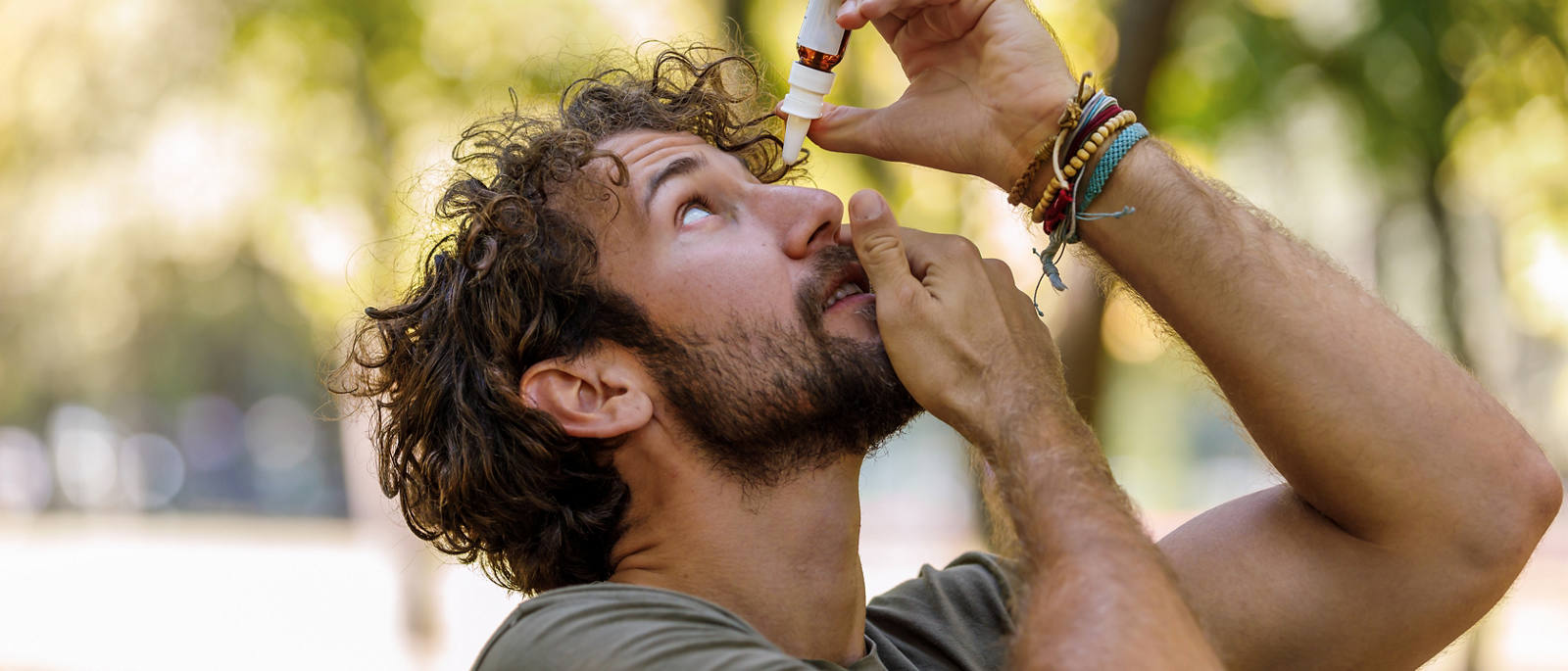Dry eyes: what helps?

It feels as though you have a grain of sand in your eye or swollen eyelids: dry eyes can be unpleasant and even indicate a medical condition. But in many cases simple home remedies are enough to help.
When do we speak of dry eyes?
On average we blink 20-30 times a minute. Each blink covers the conjunctiva and cornea with a film of liquid. If too little tear fluid is produced or if the tear fluid changes, doctors speak of the 'sicca syndrome', or simply ‘dry eye’.
Tips to avoid unpleasant dry eyes
Even if it's your first impulse – rubbing your eyes doesn't help much but irritates them even more. If possible, try also to avoid dry air and draughts (car ventilation, air conditioning, open windows when driving), as well as cigarette smoke. In closed rooms, it’s also helpful to let in fresh air from time to time.
What helps with dry eyes:
-
Computer screen work: now and again, take your eyes off the screen and look into the distance. Make a point of blinking, because working at a screen generally slows down the frequency of your blinks. People who suffer from what’s known as ‘office eye syndrome’ do well to close their eyes briefly from time to time.
-
Simple eye exercises are easy to incorporate into everyday life and can help with tired and dry eyes.
The best home remedies for dry eyes
Even if their effects have not been scientifically proven, simple home remedies at least relieve the pain and provide short-term relaxation for many people with irritated eyes.
Black tea
Pour hot water over two tea bags, and let them draw briefly. Allow to cool slightly and place on closed eyes for 10 minutes. This should reduce the swelling and have a relaxing effect.
Cucumber slices
This classic remedy is said to refresh and relax the eye area.
Omega-3 fatty acids
They are found in oily fish or in Swiss superfood flaxseed, and are also said to help as an ingredient in eye drops. However, whether omega-3 eye drops are better than other drops is disputed.
Eyelid hygiene
Carefully clean the edge of your eyelid with warm water and massage gently with a cotton swab.
Typical symptoms of dry eyes
Not all patients with dry eyes display the same symptoms. Typical symptoms often appear in combinations and include:
- feeling of something in your eye
- stinging eyes
- itchy eyes
- sensitivity to light
- tired eyes
- swollen eyelids
- red eyes
- blurred vision
- sticky lids, mucus formation
- feeling of pressure on the eyes
- watery eyes
Most common causes
Although it is often external influences that lead to dry eyes, they can also be a side effect of other illnesses affecting the body.
- production of tear fluid decreases with age
- hormonal changes
- general disorders such as diabetes, rheumatic diseases, thyroid gland diseases, viral infections
- red eyes due to dilated blood vessels in the conjunctiva
- contact lenses: contact lenses vary in how quickly they cause the eye to dry
- skin diseases
- medications such as antihistamines
- dry air from heated or air-conditioned rooms
- working at a screen
- inflammations
- vitamin A deficiency
Diagnosis and analysis by an ophthalmologist
To find out the cause of your dry eyes, the first thing you need is a diagnosis from your ophthalmologist. The doctor will, for example, analyse the tear fluid, the tear break-up time (how quickly the tear film on the eye surface 'tears' after blinking), or perform what is known as a Schirmer’s test.
Why the tear film is important
The tear film consists of three layers: an oily, a rather slimy and a watery layer. It not only keeps the surface of the eye moist but also protects the eye from external influences and cleans and nourishes the cornea.
Treatment of sicca syndrome (dry eyes)
The best thing is to eliminate the cause of the sicca syndrome. However, people who have trouble working at a screen, for example, or who have dry eyes due to an illness, often apply ‘artificial tears’, i.e. eye drops or eye ointments as a first step. These drops keep the tear film intact. Please note: different eye drops are given, depending on the cause and the patient. It’s therefore worth going to the doctor as dry eyes that are left untreated will cause long-term damage to the cornea.


